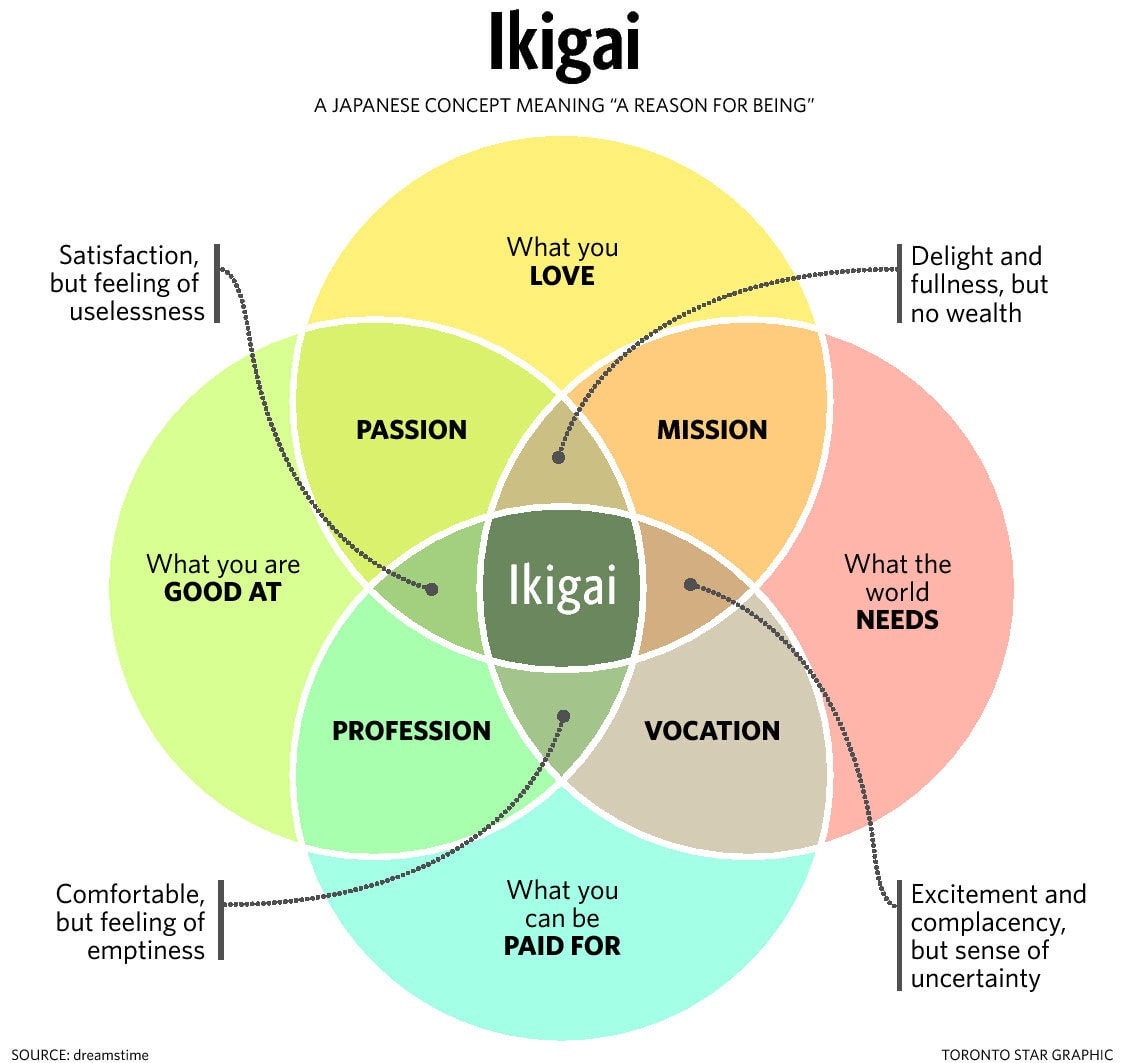Ikigai: A Designer's Guide to Finding Your Purpose in Life
Ikigai is found at the intersection where your passions and talents converge with the things that the world needs and is willing to pay for.
Running my business gave me a sense of purpose and excitement every day!

Glynis standing in front of Aloha sign
My clothing business satisfied my love for traveling as well, taking me to different destinations for trade shows and conventions. I’ve been to Sydney, Hong Kong, London, Paris, Amsterdam, Seoul, Tokyo, Bora Bora and several of the Hawaiian islands.
Which destination has been my favorite?
Hawaii, because of the stunning beaches and landscapes, rich culture, welcoming spirit, and delicious food!. So far I’ve explored Maui, Oahu and the Big Island. I hope one day to go to Kauai.
Beyond career— The Japanese secret to a long and happy life
However, in Okinawa, Ikigai is not just limited to a professional context, it is considered to be the reason for being, a sense of purpose and fulfillment in life. It is a combination of one's passion, mission, vocation, and profession. It is believed that having Ikigai leads to a longer, healthier, and more fulfilling life.
Okinawans believe that everyone has an Ikigai, and it is their responsibility to find it. It can be a simple and humble purpose, like taking care of grandchildren or gardening, or it can be a grander purpose, like contributing to society through a profession or volunteering.
Living according to Ikigai requires a balance between the things that one loves, the things that one is good at, the things that the world needs, and the things that one can be paid for. It involves self-reflection, discovering one's strengths and weaknesses, and finding ways to align personal values with actions.
Incorporating Ikigai into our lives can bring a sense of clarity, motivation, and joy. It can help us navigate the uncertainties of life and make decisions that align with our purpose. As the Okinawans have shown us, living according to Ikigai can lead to a long and fulfilling life.
How to Find Your Ikigai
Identify what you love: Start by making a list of the things that you enjoy doing the most. These could be hobbies, interests, or activities that bring you joy and fulfillment.
Example: I love teaching and sharing my knowledge of the fashion industry with others.
Determine what you're good at: Next, consider your skills, talents, and abilities. Think about the things that come naturally to you and the things that others have complimented you on.
Example: I'm particularly good at making connections, collaborating, interviewing industry professionals and other business owners and sharing resources to help each other within the community to grow.
Consider what the world needs: Ask yourself what problems or needs you see in the world that you're passionate about addressing. What social or environmental issues speak to you? What changes do you want to see in the world?
Example: I want to change how the industry traditionally operates, by offering more transparency about how fashion companies actually conduct business behind the scenes. This industry has been known to be very “closed off”, reluctant to share best practices and “secrets". I want knowledge to be shared and accessible to all designers and brand owners so that they can make the best business decisions that benefit their businesses, the people and the planet.
Reflect on what you can be paid for: Finally, consider the skills and expertise that people are willing to pay for. This could include a variety of careers or entrepreneurial ventures.
Example: As a business owner I have chosen to provide business consulting and SEO services to help launch and grow fashion e-commerce brands.
Look for overlaps: Once you have identified each of these four elements, look for areas of overlap. What activities do you love that also address a need in the world and can be monetized? What skills do you have that are in demand and also align with your passions?
Experiment and refine: Finding your ikigai may take time and experimentation. Try different things and see what feels right. Refine your understanding of what you love, what you're good at, what the world needs, and what you can be paid for over time.
So why not give it a try and find your Ikigai, just start by asking these 4 questions:
- What do you love?
- What are you good at?
- What does the world need?
- What can you be paid for?
Conclusion
Ikigai is a Japanese concept that focuses on finding one's purpose and fulfillment in life. It involves discovering the intersection where one's passions, talents, the world's needs, and what one can be paid for converge. Incorporating Ikigai into our lives can lead to a sense of clarity, motivation, and joy, as well as a longer, healthier, and more fulfilling life, as seen in the Okinawan culture. Finding your Ikigai requires introspection, self-reflection, and aligning personal values with actions. By following the steps of identifying what you love, determining what you're good at, considering what the world needs, and reflecting on what you can be paid for, you can discover your Ikigai and live a more purposeful and fulfilling life.





